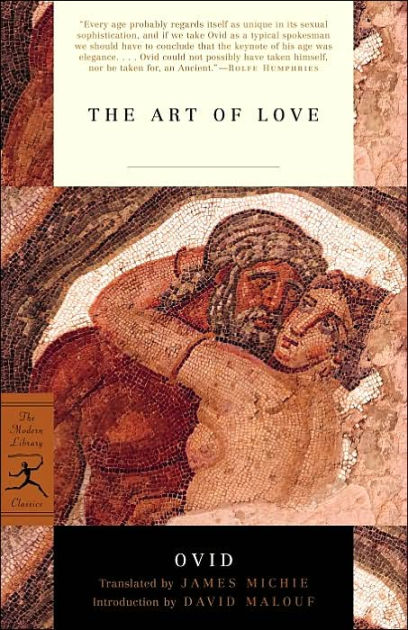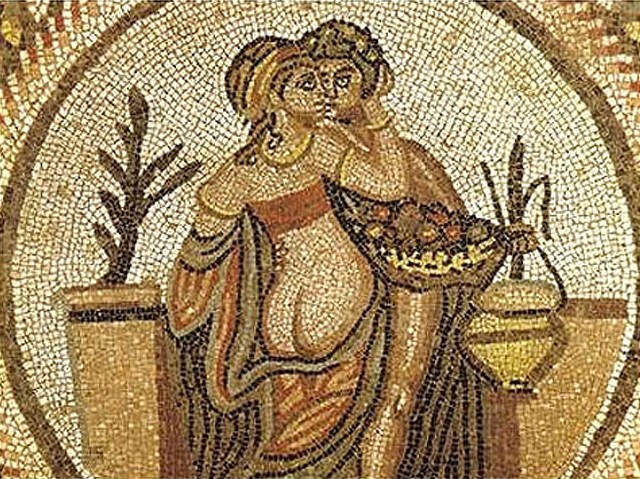This is the first of two articles corresponding to the three parts (books) of The Art of Love:
a. How to seduce and keep women (Book 1 & 2)
b. How to seduce and keep men (Book 3)
Read the following as an introduction before you continue: Why Ovid’s Ars Amatoria is a challenging book to read
Note: There’s two translations available of the book, one by A. S. Kline and the other is by James Michie. The latter is used here because its rhyme scheme brings out the original humor of the work in Latin.
Disclaimer: Unfortunately some of us need this reminder: A few of Ovid’s instructions are outdated and immoral, and some are even worse. If you sexually force yourself on a woman (or take advantage of her while she’s passed out drunk), not only will your amorous pursuit be over, but you’d also be considered a rapist!
Where to pick up a woman:
I’m not recommending an expedition
Overseas or a gruelling march; look nearer home
And you’ll say, “The prettiest girls in the world are in Rome”-
[…]
If you fancy adolescents,
One stunner out of plenty
Will emerge and dazzle you; if you like them over twenty,
The range of available talent is so rich
That your only problem will be which;
And if you prefer mature, experienced women,
Believe me, they’re as common
As blackberries. 1Ovid, The Art of Love, trans. James Michie (New York: Modern Library, 2002), 7.
Search for her at places of entertainment, places of worship or even law-courts:
Don’t forget to go
To the Danaids’ portico
Where the fifty sculptured virgins meditate
Their luckless cousins’ fate-
The multiple murder planned
By their fierce father Belus (here shown sword in hand).
And don’t miss the shrine where Venus weeps
For Adonis, the synagogue where Syrian Jewry keeps
The sabbath sacred, or the Memphian temple
Of the linen-clad heifer Io, whose example
Has taught many a courtesan
To offer her body to a man
As she did hers to Jove.
The law-courts, too, are fertile grounds for love,
Believe it or not-yes, desire
From dry forensic tinder can catch fire. 2Ibid., 7-9.
Some of the spots listed by Ovid were known as shady and mainly for picking up women selling themselves. Note the mention of the Jewish synagogue. Many Jews lived at the time in Rome. (Note: Poetic references to mythological gods and goddesses are explained below.)
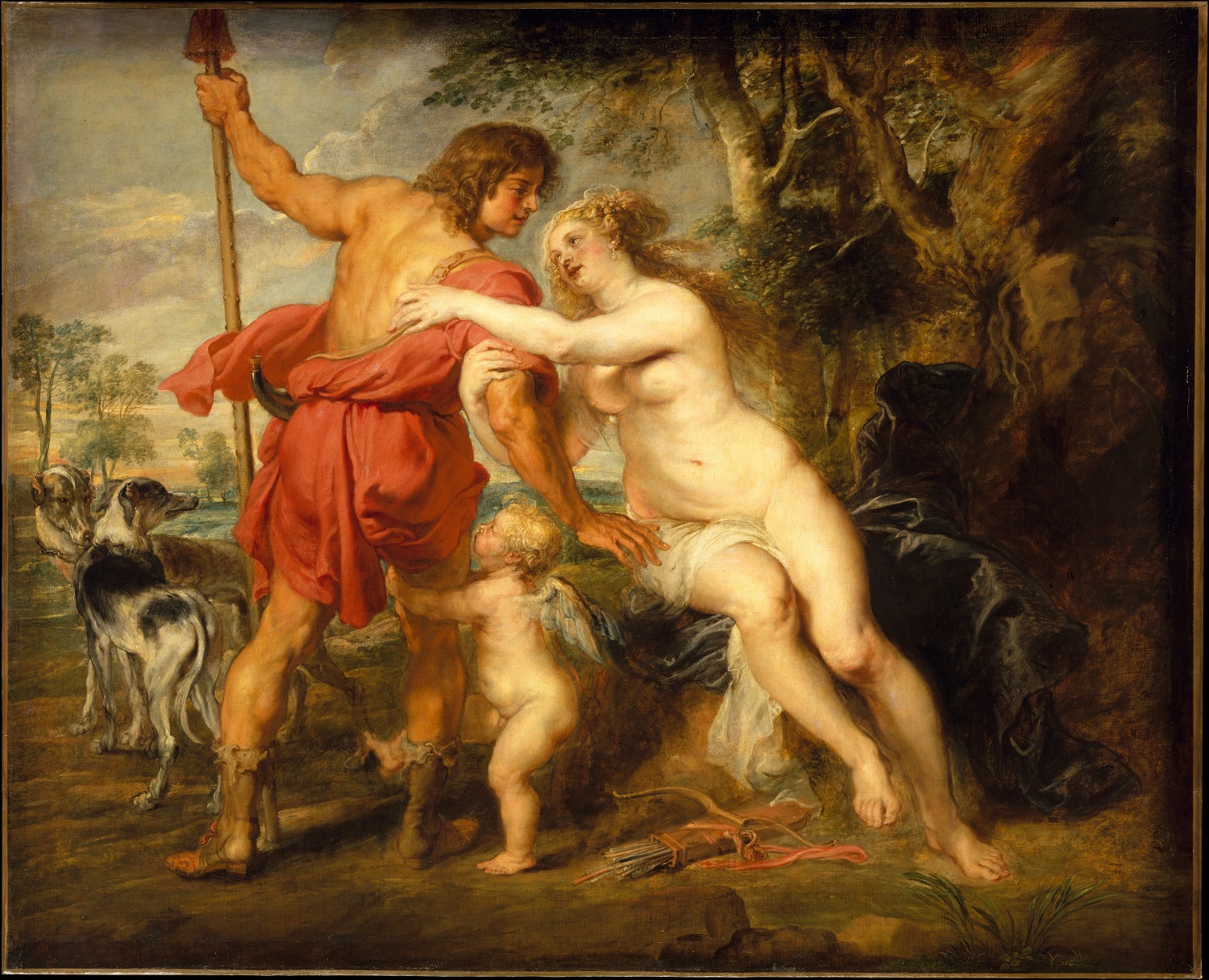
Search for her at the theater: Above all, comb the curved theatre-that’s the place Search for her at the races: And don’t miss the chariot races: the big Circus Perhaps the most bizarre place suggested by “the master” for men to find a date is where the couple could possibly sit and watch a man fight to death. Modern readers would have difficulty understanding the entertainment Romans appreciated in the bloody and brutal gladiator fights. Don’t miss the poetic comparison of courtship to the gladiator fights for victory and the potential “wounds” inflicted by the pursuit of love. Search for her at the beaches: Take Baiae, its shores fringed with pleasure craft, Baiae was a town near Naples known for being a spot for wild beach parties. It featured a copious amount of drinking and sex. Court her at the dinner-table, but beware of your judgement under the influence of wine: Wine rouses the heart, wine makes all men “Paris made his choice” is explained here in a Mythology Spotlight box titled: Venus bribes Paris. Take the lead with your mistress: If we males unanimously agreed Secure the cooperation of her maid: But first get to know your quarry’s maid—she’s the key Don’t seduce the maid: Will it help your cause, you may ask, to seduce the maid? If you must, seduce the maid only after you’ve slept with her mistress: On the other hand, Avoid her on her birthday (she’ll expect gifts!): Your mistress’s birthday, surely the most unpleasant There was an original form of birthday cakes in Roman culture. They became popular again in Western Europe in the 19th century. Target mature women and never ask for age: Don’t ask her age, under which consul her birth If your target is not a single woman: If she’s come escorted, your best plan Pretend to be drunk is another of Ovid’s questionable tips to get away with crossing boundaries at social functions. He does not explicitly mention “the husband” but the context is clear. This piece of advice was probably the most problematic for the book’s first readers. To encourage adultery is to encourage committing a crime in ancient Rome, not to speak of its immorality. It has long been speculated that his exile could be blamed on several transgressions, one of which is his repeated incitement of adultery in this book and others. Ensnare her with flattering: It’s not hard—all women think they’re worth loving, the plain It’s fine to deceive her with false promises: Don’t be shy of making promises; women are fair game The femme fatal as a sexist archetype predates the biblical characters of Delilah, Salome and Jezebel. In fact, that female archetype was almost universal. Among the best known deadly women from classical antiquity are the Sirens, the Sphinx and Medea. With that unfortunate attitude to women, it would make sense for Ovid to advise men to attempt to “deceive the deceivers.” He mentions some legendary stories (explained below) to drive his point. If she’s upset, move her with your tears. If you have no tears, then fake them with water. Tears, too, can be helpful—they can move adamant. Some mythological stories featuring romanticized rape: Phoebe was raped by her lover, Hilaira by hers, Note Ovid’s repeated insistence that women’s resistance not be taken seriously. The Romans tended sometimes to romanticize rape through mythology, as in the rape of the Sabine women, although it was considered a terrible crime, as in the rape of Lucretia, who was praised for committing suicide when raped by Sextus Tarquinius after making her husband swear to kill the rapist. If your force upon her fails, then tell her you just want to be her friend: But if you find your pleas only produce disdain, Serve her at all times: Play any role she wants to cast you in. Serve your woman like it’s a military service: So, while your years and powers permit, Compliment her on everything: If the girl’s Medusa was a monster described as a woman with snakes for hair. One gaze upon her freezes the victim into stone. Make her miss you—absence does make the heart grow fonder: See that your girl grows But don’t keep away for too long otherwise she’ll rightfully find herself another lover: But brief partings are safest: affection grows slack If you’re caught lying, stick with your lie, then make up in bed: If you’re caught out, if your carefully concealed sin Stir her jealousy with your bad behavior: So love, grown lazy and self-satisfied, Both lovers should equally enjoy sex and also reach orgasm, which is why women are preferable over boys: I hate it when both partners don’t enjoy In same-sex relations of ancient societies, the pleasure, and sexual climax, of the person being mounted would normally not be considered, since the center of the experience was the person assuming the masculine role. Ovid’s rejection of relations with male adolescents is not on a moral basis but rather a statement on why intercourse with women is superior since both could and should reach orgasm. Aim for simultaneous orgasm: Once you’ve discovered the right This is the first of two articles corresponding to the three parts (books) of The Art of Love: Ancient controversial advice: Why you should play tricks on him and when to offer your body as a “thank-you”
The Art of Love shows how the courtship game, once played by all, has changed

Richest in spoils of the sexual chase.
There you’ll find someone to love, or a playmate, there
You can opt for one night or a solid affair.
[…]
They come to see and be seen;
Modesty, chastity mean
Nothing there. 3Ibid., 9.
Offers lots of chances for smart workers.
No need of finger-language here, no need to guess
That a nod of the head means yes:
You can sit as close to a girl as you please,
So make the most of touching thighs and knees
(The seating arrangements almost force
Physical intimacy as a matter of course).
At this point casually volunteer
An opening remark for anyone to hear.
Ask with keen interest, “Whose team’s that going by?”
And “Who are you backing?” Given a reply,
Add instantly, “So am I!”
When the gods’ ivory statues pass in the grand
Procession, give Venus a big hand,
And if a speck of dust, as it well may,
Falls in her lap, brush it away-
Brush it away even if there’s no dust:
Any gallant excuse in the service of lust.
If her cloak trails on the ground, make a great scene
Of lifting it up to keep it clean,
And if you’ve played it right
You’re rewarded at once-with her permission, the sight
Of her ankles.
[…]
Such openings the Circus offers for the study
Of the art of the pick-up; so does the grim Forum with its bloody
Arena of sand. Here Cupid has his killing-ground,
And the man who came to see blood himself gets a wound-
In the heart. While he’s touching her hand, bending her ear,
Borrowing her programme, asking if the charioteer
He’s backed will win, he feels
The shock of the arrow, the steel’s
Struck home, he groans-and the spectator
Joins in the show, a dying gladiator. 4Ibid., 11-15.
Its springs smoking with sulphur-Cupid’s shaft
Does heart damage there. One man came back with the report:
“That’s no health resort!” 5Ibid., 21.
Lovers, wine undiluted dilutes worry.
[…]
On these occasions don’t trust the lamps-they can lie:
Darkness and drink blur the judging eye.
It was in broad daylight, not after dinner,
That Paris made his choice: “You, Venus, are the winner.”
Blemishes are lost in the half-light,
Faults overlooked. Night
Turns any woman into a goddess.
When it comes to judging faces, bodies,
Jewels or clothes, I always say,
Consult the light of day. 6Ibid., 19.
Not to move first, females, crushed, would take the lead.
In lush fields the heifer moos to the bull, the mare
Whinnies at stallions in the open air;
Men’s sex-urge is less primitive, less raw,
Our lust is bound by the limits of the law. 7Ibid., 21.
To smooth, early intimacy.
Make sure she’s her mistress’s confidante, the sort
You can trust with the secret of your private sport.
Corrupt her with promises and prayers, make her your friend:
With her good will you’ll easily gain your end. 8Ibid., 27.
Playing such games is a dangerous trade;
They act as brakes as frequently as spurs:
Will she view you as her mistress’s prize, or hers?
It can go either way, and, though you may gain
By taking a bold risk, my advice is, Abstain.9Ibid., 27-29.
If, as she ferries notes to and fro, her beauty
As well as her zeal in doing her duty
Happens to please you, then take
The mistress first and make
The maid your afters. It would be a sin
Against taste to begin
By fucking the maid. One warning (if you trust
My skilled advice, if some greedy gust
Doesn’t blow my words out to sea): Take heed,
Either don’t try at all or make damned sure you succeed.10Ibid., 29.
Day in the calendar—you’re forced to give a present.
Dodge as you may, she’ll collect: every woman discovers
Ways of extracting loot from ravenous lovers.
[…]
[She] starts to ply
You with kisses and, finally, asks you to buy—
She wants it right now, it’ll please her for years to come,
Now’s the time to get it … Protest that you don’t have the sum
In cash in the house, she’ll demand
(You’ll wish you’d never learnt to write!) a note-of-hand.
Good God, she can have a birthday at will, can make
Any date an excuse for claiming a birthday-cake.
[…]
I’d need ten mouths and ten tongues to list the damnable arts
Of these money-grubbing tarts. 11Ibid., 31-33.
Was registered: leave the stern Censor to unearth
Statistical truth,
Especially if she’s past the prime of youth
And lost her bloom, and begun
To pluck the white hairs one by one.
Young lovers, women at this middle stage
Of life, or even of maturer age,
Are well worth cultivating, there’s a rich yield:
It’s up to you to sow the field. 12Ibid., 103.
Is (he could be useful) to cultivate the man:
When you dice for the drinking order, let him instead
Of you have the honour; give him the garland from your head;
Whether he’s placed below or with you, let him be
The first to be served; defer to him, agree.
A safe and well-worn ploy is to pretend
To be the husband’s friend
[…]
Real drunkenness can harm you, but when it’s feigned
It can be of use. With a clever tongue, trained
To slip and slur, the risqué things you say or do
Will be blamed on the wine, not you.
Toast the lady, toast “the man who shares her bed”
(Secretly wishing him dead) 13Ibid., 41-43.
And the pretty being, in that way, equally vain.
(Besides, sometimes an actor will begin
To feel real love, his role become genuine.
So be nice, you girls, to those who pretend:
A bogus passion may turn out true in the end.)
Like a stream eroding the bank hanging above it,
Undermine her subtly with flattery—she’ll love it.
Neat feet, slim fingers, good features, charming curls—
Never tire of praising them. Even good girls
Adore extravagant compliments, even virgins take
Loving care over the impression they make. 14Ibid., 43-45.
For promise-makers; invoke any god you care to name
To witness your oath. Jupiter from above
Smiles on the perjuries of men in love
And bids the Aeolian winds shred them in air.
He himself would often swear
To Juno with a hollow
“By the Styx!,” and now he favours all who follow
His bad example.
[…]
A wise man will cheat
No one but women—it’s not a risky feat,
And only here there’s a kind of duty in deceit.
Deceive the deceivers! Since for the most part
They fib, let them fall, snared by their own art!
Egypt, they say, once had a drought, her ears
Of corn unrained-on for nine years,
When Thrasius approached the king and demonstrated
That the gods could be propitiated
By a stranger’s blood. “Then you’re the first
Victim,” Busiris said. “Cure Egypt’s thirst!”
And I could mention
Perillus roasted in his own invention,
The cruel bronze bull, by Phalaris—the biter bit.
Both kings were right, for it’s good law, and fit,
For a death-contriver to die by his own art.
So let liars fool liars, and Woman smart
From wounds in a war she was the one to start! 15Ibid., 45-47.

Then grab the opportunity to kiss her…“some force is permissible” with women:
If you can, show her cheeks wet with tears; if you can’t
(They don’t always come on cue),
Dab your eyes with water, stage-manage the “dew.”
Mix—who doesn’t who’s wise?—
Kisses with your sweet talk, and if she tries
She may struggle at first and call you a sinner,
But she doesn’t really want to be the winner.
Only take care not to cause her soft lips pain
With your raids—she mustn’t be able to complain
That you’re so rough you bruise.
Men deserve to lose
The points they’ve won already if they snatch
The foreplay kisses and fail to clinch the match.
After all the kissing, how far away
Were you from …? Ah, you were clumsy rather than shy, I’d say.
Some force is permissible—women are often pleased
By force, and like what they’re giving to be seized.
The girl whose citadel is stormed
By sheer audacity feels warmed,
Complimented; the one who could have been attacked
And taken by force but escapes intact,
Although she affects to look glad,
Feels let down, a little sad. 16Ibid., 47.
Yet both ravished sisters loved their ravishers.
And there’s the old tale—but it’s worth while
Retelling it—of Achilles and the girl from the isle
Of Scyros. It was years after Aphrodite,
In return for Paris’s award for beauty
When she triumphed on Ida over her two peers,
Gave him his fatal prize; it was years
After Priam welcomed his foreign relative,
And a Greek wife came to live
Inside Troy’s walls, and every chief
Swore allegiance to the wronged husband, and the grief
Of one man became
A people’s cause. It was while (deep shame,
Had his mother’s prayers not put him under stress)
Achilles hid his manhood in a woman’s dress.
[…]
Deidamia, who shared his bedroom, found
He was indeed a man, indeed she was “raped” (one’s bound
To accept tradition, of course),
But, still, she wanted to be taken by force.
“Stay,” she begged him again and again, “please stay,”
When Achilles was already on his way,
His distaff dumped, a warrior under arms.
But now I ask, “What harm’s
Been done by force, Princess?
Why do you wheedle and press
The author of your rape to linger?”
Agreed, shame points a finger
At girls who make the first move, but agreed
Also, it’s nice to follow a strong lead.
It’s a vain, over-confident man who expects
The woman to make the running. Our sex
Should take the initiative, propose,
Plead, coax with words—she’ll listen kindly to those.
She’ll be yours if you ask; to be asked is all she requires;
Just give her a start, and a good excuse to grant your desires.
When Jupiter wooed a heroine,
he went to her
As a suppliant—no girl seduced great Jupiter. 17Ibid., 49-51.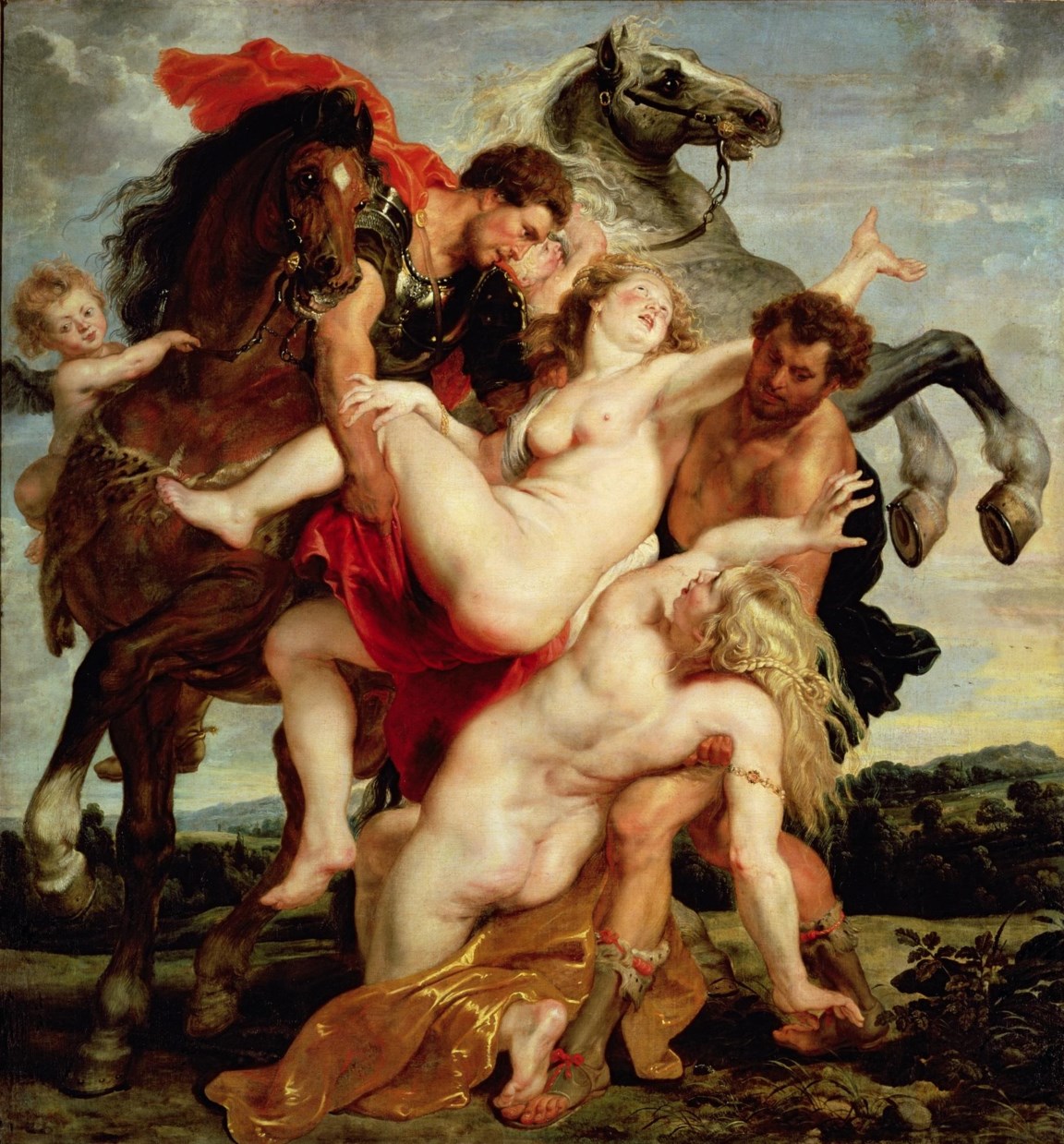
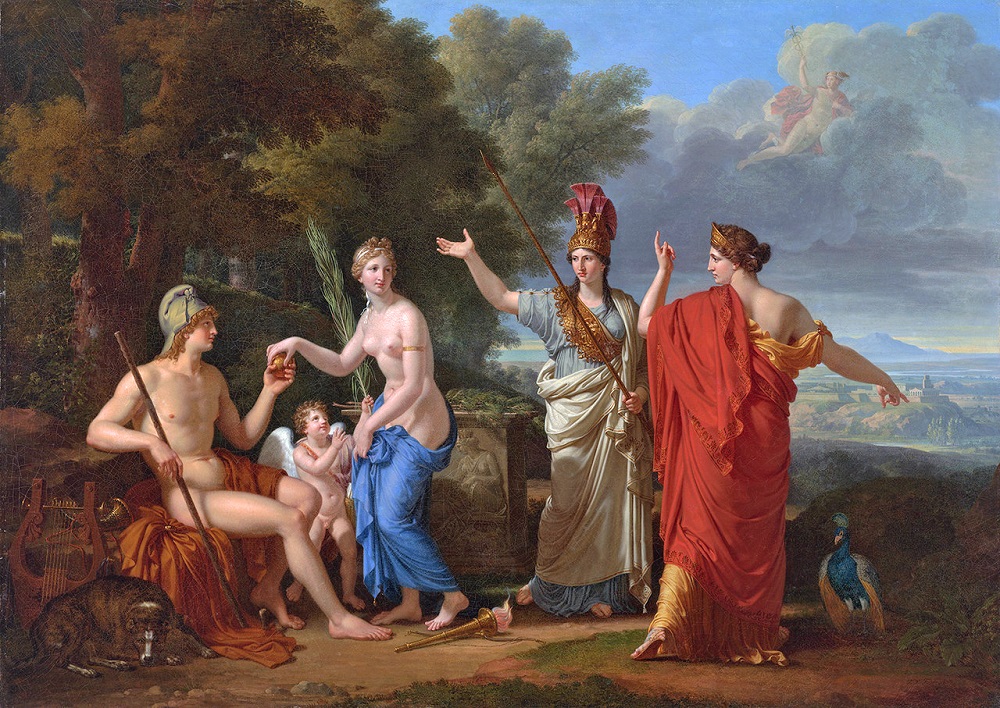

Stop, take a step back, think again.
Many women desire what eludes them and hate to be pressed;
Play it coolly, hold their interest.
Don’t ask as if you were sure of getting it in the end:
Let the lover slip through, masked, in the name of friend.
I’ve seen the hardest case fooled by this ploy—
“Best friend” in no time became “darling boy.” 18Ibid., 51.
Criticise when she’s critical, enthuse when she enthuses,
Echo her view, whatever line she chooses;
If she laughs, laugh; if she cries, remember to do the same:
Your face must obey her rules. If you’re playing a game,
Throw the dice clumsily, make a careless move;
If it’s knucklebones, let her off a forfeit if you prove
The winner, and see to it that you roll low scores;
If it’s “robbers,” let her glass man capture yours.
Don’t be too proud
To hold her sunshade and make room for her through the crowd.
Don’t feel a fool
Placing a footstool
For her pretty feet by the couch and easing
Her slippers on or off. If she’s cold, though you’re freezing
Warm her hand on your heart. And don’t think it a disgrace
To hold, with your freeborn hand, her mirror to her face—
You may look like a slave, but you’re sure to please.
When Juno tired of testing Hercules
With monsters, the hero who’d shouldered the sky and won
A place there did a stint, they say, as one
Of Omphale’s Lydian maids, held baskets, spun
Wool among them. If Jupiter’s son
Obeyed his mistress’s orders, so can you.
Go and endure what he went through!
Told to meet her in the Forum, arrive for the date
Good and early, wait,
And don’t leave unless she’s badly late.
If she summons you somewhere, drop everything, run along,
Barging and shoving your way through the throng.
At night, if she sends you a message at a party’s end,
Like her slave your job’s to attend
Her person all the way home.
The same applies if she’s away from Rome.
Love hates a lazy man. 19Ibid., 69-71.
Endure love’s labour, put up with it;
Soon bent old age, sly-footed, will arrive.
Churn the sea with oars, drive
Ploughshares into the earth, pour
Your manhood and ferocity into war—
Or expend heart, guts, balls, the lot,
On serving women. It’s not
Unlike military service—it takes all you’ve got! 20Ibid., 103.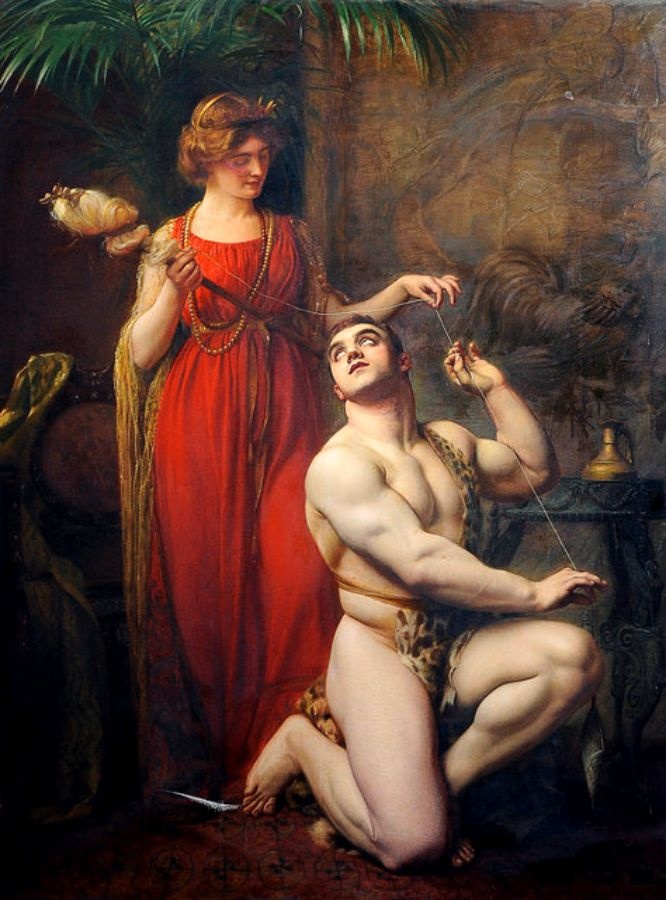
Changed her hair-style, applaud the new curls
Or the switched parting. Admire her charms—
Her voice when she sings, when she dances her arms—
And when she stops clamour for more.
When making love, you should “madly adore”
Her sensuousness and expertise,
And tell her in words the delicious things that please
You specially. She may be as rough and wild
As Medusa in bed, but for you she’s “sweet and mild.” 21Ibid., 77.
Used to you: habit’s the master key,
Daily familiarity.
If boredom’s the price, then pay. Hang around, in her sight,
Chat to her, show your face day and night;
And when you’re strong and confident, when you know
She’ll feel your absence, really miss you, go—
Give her a rest.
A field pays best
If trusted to lie fallow, dry terrain
More eagerly drinks up the rain.
Phyllis was lukewarm while Demophoön was there—
It was his sailing caused her love to flare;
When clever Ulysses left, his wife was on the rack;
And you, Laodamia, longed for your husband back. 22Ibid., 79-81.
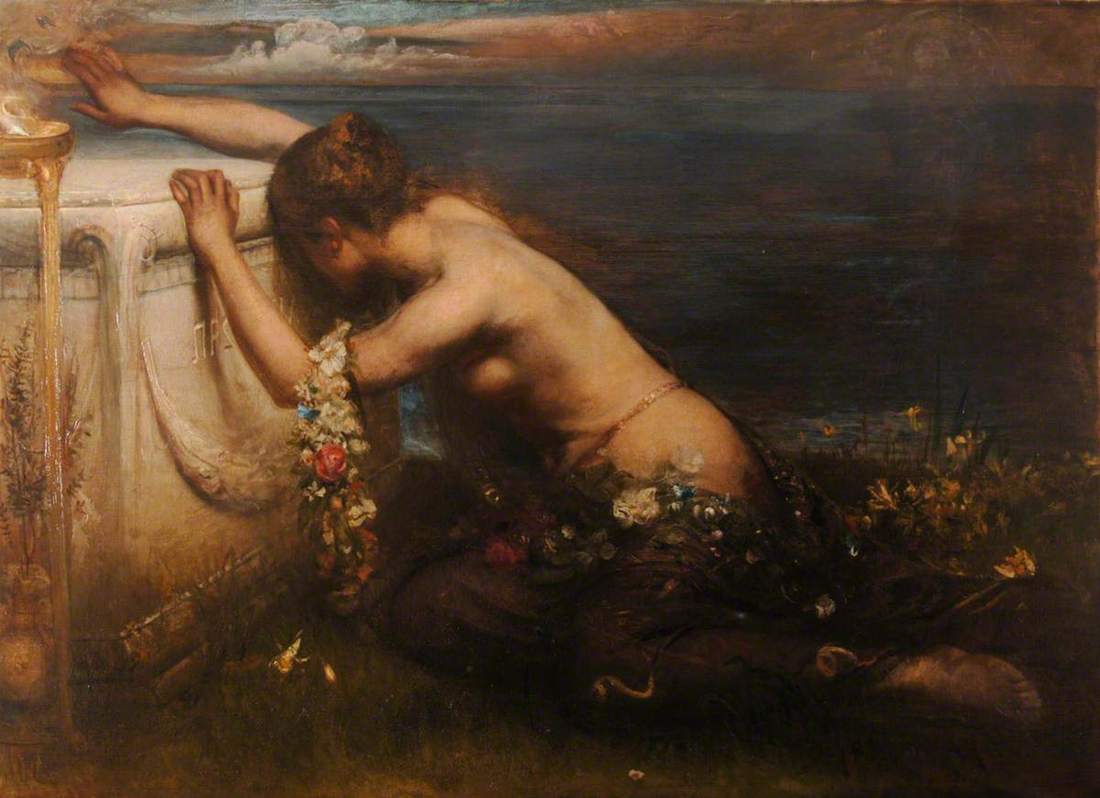
With lapse of time, and it’s not long before
The old love fades and the new comes through the door.
When Menelaus was abroad,
Helen, being bored
And lonely at night, found warmth on the breast
Of her husband’s foreign guest.
O Menelaus, I can’t help wondering whether
You were sane to go off, leaving them together
In the same house. Madman, do you trust doves to a kite?
Or a full sheepfold to a wolf at night?
Neither Helen nor the adulterer carries blame:
You or any man would have done the same.
By offering time and place you almost force
Adultery; if you map out the course,
Isn’t she going to take it? What could she do,
Menelaus, far from you,
With a stylish stranger around, frightened and lonely
In an empty bed? Think hard.
You were the only
Culprit. In my view Helen doesn’t bear
The blame for the affair—
Her husband was complaisant, Paris there. 23Ibid., 81.
Comes to light, still lie through thick and thin.
Don’t be extra nice to her, and don’t feebly wilt:
Both are sure signs of guilt.
Take her to bed—all peace is made on the pillow—
And with all you’ve got disprove your peccadillo. 24Ibid., 85.
To be rekindled needs some shock applied.
Heat up her lukewarm heart, alarm her with tales
Of your bad behaviour, so that she pales.
Trebly, incalculably happy is the lover
Whom an injured mistress agonises over.
As soon as she hears what she’d rather not know,
The poor girl faints—her voice, her colour go.
How I’d like to be the man whose hair she tears,
Whose soft cheeks she scratches, at whom she glares
With lovely, tear-filled eyes, the man she would
Cut out of her life, if she only could!
How long should you let her sulk? Not long. The longer
You put off making it up, the stronger
Her anger will grow. To prevent this,
Throw your arms round her neck, give her a kiss,
Pull her sobbing to your breast, hold her there tight,
Keep kissing her, treat her to the delight
Of Venus while she’s weeping. That’ll bring peace:
It’s the one sure way to make the tantrum cease.
When she’s raged her fill but still seems unreconciled,
Then sue for terms in bed, and you’ll find her mild.
Bed is the place, arms laid down, war forsworn,
Where Harmony dwells, where Tenderness was born. 25Ibid., 87-89.
A climax—that’s why a boy
Doesn’t appeal to me much. But my abomination
Is a girl who does it from a sense of obligation,
Who lies there dry, her thoughts flitting
Back to her wool and her knitting.
For me, that’s service, not pleasure: I’ll have no truck
With a dutiful fuck.
I like to hear her rapturous gasps imploring
Me to take my time, keep boring,
To watch her come with surrendering eyes, then, flaked out,
Insist on a long pause before the next bout. 26Ibid., 105.
Places to touch, the ones which delight
Women most, don’t hold back through shame,
Carry on with the game,
And you’ll see her eyes light up, flash and quiver
Like sunlight on the surface of a river.
Soon she’ll be murmuring, moaning, gasping, saying
Words in tune with the instrument you’re playing.
But take care not to crowd on sail and race
Ahead of her, don’t fall behind her either; matching pace,
Arrive together at the winning-post
In a dead heat. Of all pleasures this is the most
Exquisite, when a man and a woman, satisfied,
Lie in mutual surrender, side by side. 27Ibid., 107.
a. How to seduce and keep women (Book 1 & 2)
b. How to seduce and keep men (Book 3)
You might also like:
Ovid’s Art of Love: How to seduce and manipulate him with sex
BOOK: THE ART OF LOVE

Read Ovid’s immoral dating guide for a balanced insight into the #MeToo movement
BOOK: THE ART OF LOVE
Endnotes

